In the vibrant and culturally rich landscape of Ethiopia, the dating scene has started to embrace modernity with the increasing popularity of apps like Tinder. For many, it's a novel avenue to connect with others beyond their immediate social circles.
While Tinder is primarily known as a dating app, its role can extend far beyond casual meetings. In Ethiopia, it opens doors to new relationships and social networking opportunities that can create avenues for economic benefits. However, using Tinder effectively comes with its own set of cultural and logistical challenges that are unique to the region.
This article explores these fascinating dynamics, providing insights and tips on how to leverage Tinder not just for romance but potentially as a pathway to financial opportunities. It's a digital era exploration that reflects the changing social fabric of Ethiopia and the innovative ways its people are adapting.
- The Rise of Tinder in Ethiopia
- Cultural Considerations and Social Dynamics
- Economic Opportunities through Tinder
- Challenges Faced by Users
- Tips for Successful Use of Tinder in Ethiopia
The Rise of Tinder in Ethiopia
In the heart of Ethiopia, where bustling city life meets age-old traditions, Tinder has quietly started making its mark. This app, synonymous with modern matchmaking around the globe, has found its niche among Ethiopia's tech-savvy youth. They see it as a tool not just for finding dates but for expanding their social circles in an ever-globalizing world. As urban centers like Addis Ababa continue to grow, young Ethiopians are embracing online dating apps as a way to connect with people they might not otherwise meet. Tinder provides a platform for individuals seeking not just romance but friendship and professional networking opportunities as well.
Given Ethiopia's young population, with over 60% under the age of 25, the potential user base for Tinder is immense. This demographic is keen to explore new social constructs, driven by a desire for modernity while balancing tradition. The usage statistics reflect a noticeable increase, with many young people opting for digital over traditional means of finding partners. But the rise of Tinder here isn't just about romantic connections. It's become a space where ideas, cultural insights, and even business propositions can be shared, showcasing its versatility as a platform beyond dating.
The internet revolution has swept across Ethiopia, catalyzed by improvements in telecommunications infrastructure. While still developing, these strides have made apps like Tinder more accessible, particularly in urban areas. The widespread use of mobile phones has bolstered this trend, enabling young people to engage with this global phenomenon right from their fingertips. And as more Ethiopians gain access to the digital world, the potential for growth in online dating and networking continues to surge. In essence, Tinder offers a digital meeting place where Ethiopia's rich cultural tapestry meets modern technological advancement.
"Technology is not just connecting people; in Ethiopia, it's creating new opportunities by challenging traditional social boundaries," says Emilia Tesfaye, a digital analyst studying technological impacts on African societies.
One of the compelling drivers behind the rise is the changing perceptions surrounding online dating in Ethiopia. While initially met with skepticism, there's a growing acknowledgment of its value. This shift is largely fueled by positive narratives from users who have found meaningful connections or even lucrative opportunities through the platform. These success stories, often shared within communities, help demystify the stigma around digital matchmaking. Moreover, Tinder's user-friendly interface and global presence make it an appealing choice for young Ethiopians eager to connect with the world outside their immediate environment.
The emergence of Tinder in Ethiopia reflects a fascinating intersection of tradition and innovation. It's a trend that highlights the country's adaptation to modern tools, showing a readiness to incorporate these into its vibrant social landscape. As such, the rise of Tinder isn't just a symptom of global digital trends but a testament to Ethiopia's dynamic approach towards its future. It's about how technology meets cultural evolution, crafting new stories in the age-old narrative of human connection.
Cultural Considerations and Social Dynamics
When venturing into the realm of Tinder in Ethiopia, an understanding of the country's rich tapestry of cultures and social norms is vital. The Ethiopian culture is a mosaic of ethnic groups, each with its traditions, which makes the dating scene uniquely varied. Social interactions tend to be conservative, with a strong emphasis on family values and community influence. Dating, which may appear casual elsewhere, is a more serious endeavor here, often intended to lead toward long-term commitment. This shapes how individuals perceive apps like Tinder, where intentions can differ significantly from Western contexts.
The Ethiopian diaspora has also influenced the use of Tinder, where people are keen to connect with others either locally or across their communities globally. Many users are seeking connections that align with their inherent cultural values, which can sometimes lead to a more cautious and thoughtful engagement on the platform. The idea of international connections, drawn through Tinder, brings a layer of complexity, making cultural exchange both a blessing and a challenge. There is a curiosity and openness to learn from other cultures, yet this is balanced with a desire to maintain cultural integrity.
Furthermore, the role of language is important to consider. Amharic is the official language, along with a myriad of other languages spoken across Ethiopia's regions. Language choice can become a significant factor on Tinder, influencing who can successfully communicate and build rapport. For instance, speaking fluent Amharic or even demonstrating an interest in learning it can be flattering and meaningful, signaling respect and shared experience. In this light, digital interactions are not just about finding romance but also about validating and respecting rich local cultures.
Gender Roles and Expectations
Understanding gender roles is another layer of complexity within Ethiopian social dynamics. Traditionally, there's a clearly defined expectation where men are often viewed as the pursuers, and this persists in many regions. Yet, with platforms like Tinder, these roles are occasionally challenged, offering a space for more progressive interactions. This can empower individuals, particularly women, to choose when, how, and with whom they engage, redefining personal narratives in the realm of dating.Finally, the intersection of technology and tradition poses intriguing questions. How quickly society adapts to these new tools may vary, often depending on the balance between embracing modernization and upholding values. Mobile technology is rapidly growing in Ethiopia, with a notable surge in internet users, but access remains a luxury for some, primarily in urban areas. This urban-rural divide impacts Tinder's penetration and the ways it is perceived or utilized across different societal strata. A report by the Ethiopian Communications Authority noted a 25% increase in internet users over the past two years, with dating apps seeing a proportional rise in interest.
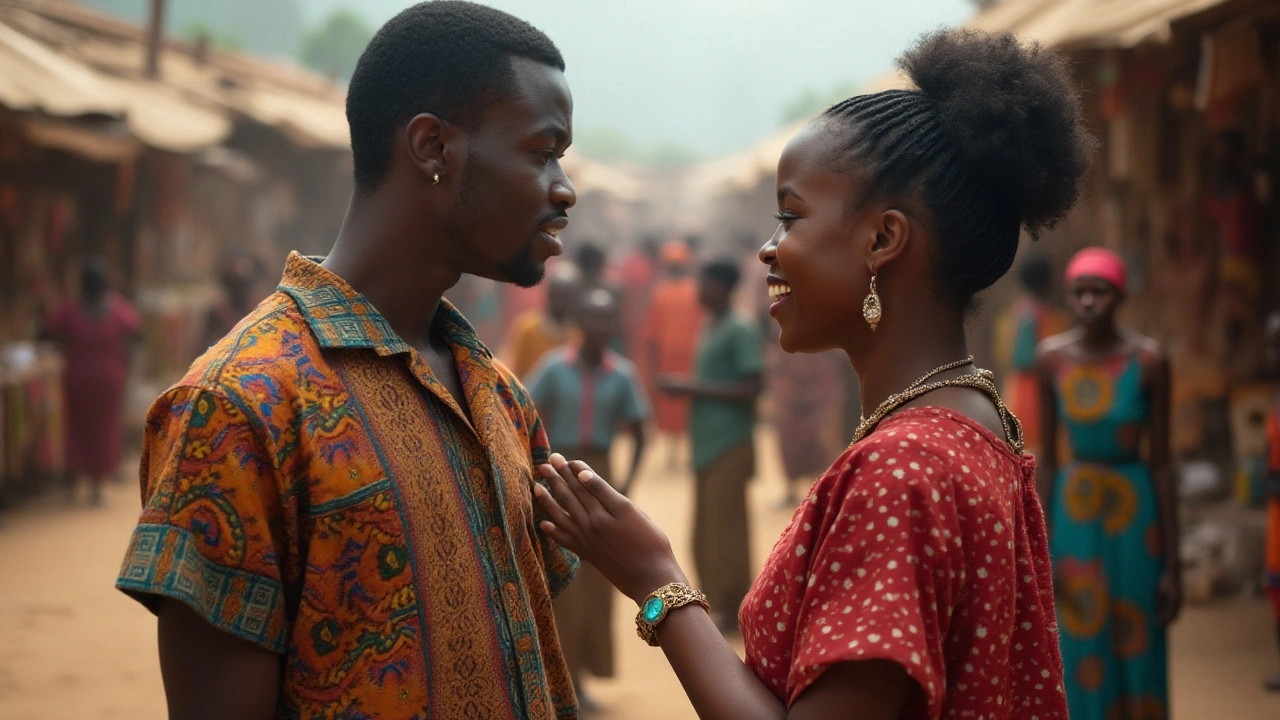
Economic Opportunities through Tinder
Stepping into the world of online dating through apps like Tinder in Ethiopia might not immediately shout 'business opportunity', but there's a subtle shift happening beneath the surface. Among its users, Tinder is beginning to branch out beyond dating. It's not merely about swiping right on romance but could be a vehicle for economic interconnection. This is particularly evident among freelancers and small business owners who leverage the app's networking potential.
A practical way Tinder is being utilized economically is through collaborations, especially in creative fields such as photography, music, and art. Ethiopian artists and entrepreneurs are meeting potential partners or collaborators, which can lead to work that might not have been accessible through traditional routes. By establishing more connections, individuals can tap into markets and audiences they previously didn’t have the means to reach.
There’s also an interesting trend where businesses extend their visibility by including links or mentions about their services in their profiles. Think personal trainers offering online sessions or fashion designers showcasing their latest creations. It's subtle but allows users to engage curiosity about what Ethiopian creators are up to, potentially translating ephemeral swipes into sustained business interests.
"Platforms like Tinder provide unique opportunities for creative professionals to network and discover diverse partnerships," remarks Addis Alemayehu, a local entrepreneur who has found collaborations through the app. This insight is shared by many who see the digital space as a new frontier for business growth and idea exchange.
Moreover, this platform can influence the tourism sector. Travelers looking to explore Ethiopian culture can connect with locals who might offer personalized tours or insider tips, possibly leading to arrangements that resemble a form of 'cultural exchange service'. This aspect of Tinder can contribute indirectly to the local economy through tourism and hospitality.
Leveraging Visibility and Engagement
It's crucial for entrepreneurs using Tinder to create an impactful profile. They should aim to be both authentic and strategic. Including a compelling image and concise, engaging descriptions of what they offer helps draw the right kind of attention. A few have used it to transition initial chats into more professional discussions on platforms like LinkedIn, which can solidify serious business relationships.The flexibility in usage is what makes Tinder an unconventional yet promising tool for economic activity. The key lies in understanding one's unique value proposition and communicating it distinctively amidst a sea of personal pursuits. Even competitors could potentially become collaborators when interests align over common goals.
For those daring enough to explore, Tinder in Ethiopia represents untapped terrain for growing one’s professional network and making money creatively. While it's essential to remain aware and navigate the usual perils of online interactions, the app's social currency might dramatically enhance one's economic perspectives if leveraged with intent and clarity.
Challenges Faced by Users
For many in Ethiopia, delving into the world of Tinder presents a mix of excitement and hurdles. The first major challenge revolves around connectivity issues. Internet access in Ethiopia can be inconsistent, which complicates the steady use of such apps. Areas of rural Ethiopia, where much of the population still resides, often struggle with poor network coverage. This lack of reliability can frustrate users who rely on consistent connectivity to maintain conversations and build digital relationships.
Another significant hurdle is cultural acceptance. Ethiopia's social fabric is woven with tradition and often places a strong emphasis on relationship customs. This cultural backdrop creates a stigma around online dating, viewed by some as less legitimate compared to traditional forms of courtship. Family expectations can further complicate matters, as many individuals feel pressured to adhere to conventional methods approved by their elders.
Safety concerns also loom large over the digital dating experience in Ethiopia. Users are apprehensive about privacy and the risk of fraud. The fear of encountering scams is a real deterrent, exacerbated by the relative novelty of the platform in the region. Many potential users are wary of sharing personal details on dating platforms, which they perceive as less secure. Enhancing awareness about safe practices is essential to alleviate these concerns among new users.
"Navigating Tinder in Ethiopia requires an awareness of both the potential benefits and the unique obstacles that come with it." - Innovative Africa Journal
Language barriers can further complicate communication on Tinder. While English is widely taught, not everyone in Ethiopia is fluent, and this can limit interactions. Users might find it challenging to accurately convey their thoughts and intentions. This barrier sometimes leads to misinterpretations and discourages effective communication, impacting the overall user experience on the platform.
Additionally, there is an economic challenge for some users. Using Tinder can become expensive due to data costs in Ethiopia, which adds financial strain to individuals who want to remain active on the platform. This economic barrier can discourage consistent engagement, especially among younger users who might be looking for affordable connectivity options.
Adapting and Overcoming
Despite these challenges, the Ethiopian Tinder scene is gradually evolving. The introduction of alternatives, such as Wi-Fi hotspots in urban centers and educational initiatives about online safety, are small but meaningful steps in the right direction. Increased awareness and adaptability are leading more people to explore the potential that Tinder holds, not just for forming personal friendships but possibly for broadening their professional networks as well.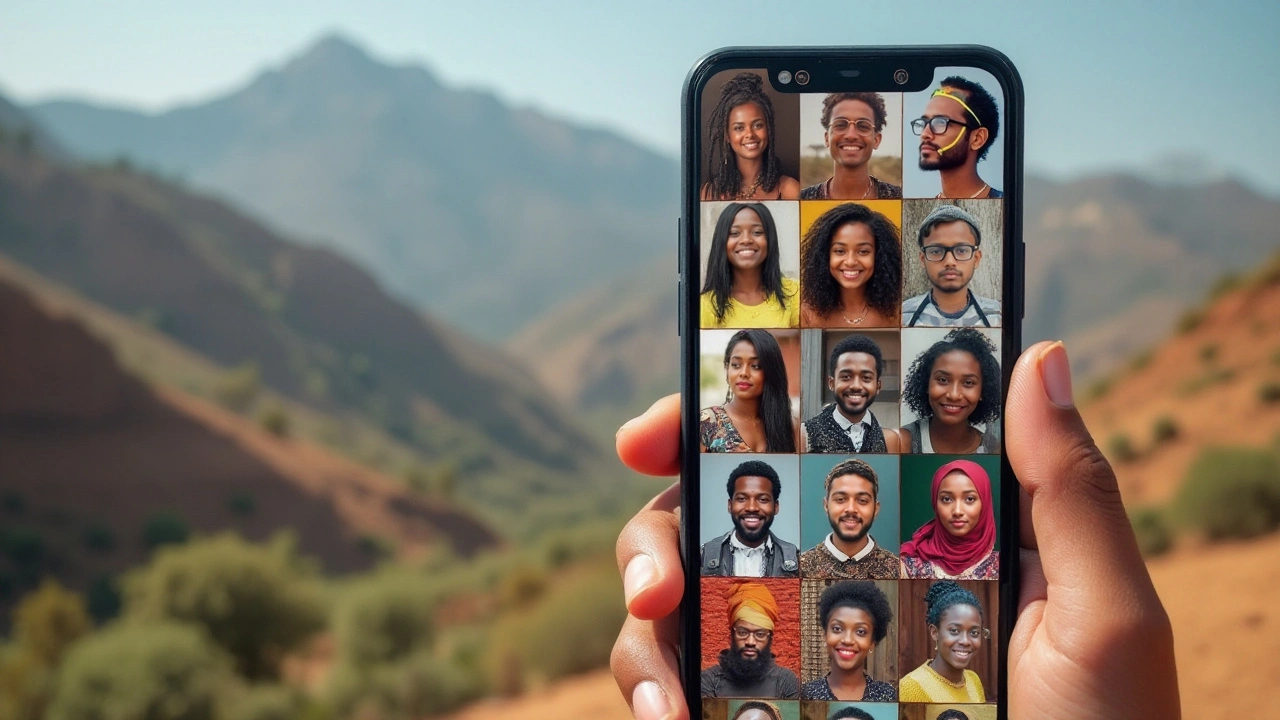
Tips for Successful Use of Tinder in Ethiopia
Using Tinder in Ethiopia presents unique opportunities and challenges, but a few practical tips can make this experience more rewarding. First and foremost, understanding the cultural nuances at play can greatly enhance your interactions. Ethiopia, being a country with rich traditions and social norms, requires a certain level of respect and awareness in digital communication. Start by crafting a profile that genuinely reflects your personality and respects local customs, avoiding anything that might come across as overly assertive or disrespectful. Engaging in profiles meaningfully, especially those reflective of Ethiopia's cultural diversity, signifies a genuine interest that could spark rapport.
Beyond crafting a suitable profile, managing your settings is crucial. In urban centers like Addis Ababa, you will find a bustling community on Tinder. However, settings like distance range and age preferences play a pivotal role in ensuring your compatibility with potential matches. Many users opt to optimize their settings periodically to explore various parts of the city or demographic groups. Experience has shown that a radius of few kilometers accommodates a mix of vibrant, local connections, enriching one's experience with varied cultural insights and perspectives.
An often-overlooked aspect of using Tinder in Ethiopia is active engagement. It's not just about swiping right; meaningful conversations build the bedrock for lasting connections. Show curiosity about the interests and backgrounds of your matches, investing time to learn about different cultural facets and day-to-day experiences of Ethiopians. Through these genuine interactions, Tinder can transcend its role as a mere dating app, becoming a platform to share and understand different worldviews. A report by Statista suggested that online dating in Africa, including Ethiopia, has seen a 20% increase in user engagement year over year, indicating the growing acceptance and utilization of these platforms in everyday life.
Networking and relationship-building through Tinder can present economic opportunities as well. For those involved in local businesses or entrepreneurial ventures, leveraging Tinder's social aspect to connect with like-minded individuals or even potential clients and partners is a strategy adopted more frequently. Imagine meeting someone who shares mutual business interests or someone willing to support your startup. Such connections require clarity of purpose in conversations and focusing on mutual benefits rather than outright business pitches, as these can feel intrusive. Treat each interaction as a potential door to new opportunities rather than a transaction.
"Building meaningful connections is about seeing the 'user' as individuals with stories and goals, not just pixels on a screen," says renowned sociologist Dr. Amare Getachew.
Safety is paramount when using any social app, especially in regions where internet privacy laws may not be robust. Be mindful of sharing personal information and meeting up in unfamiliar settings. Arrange initial meetings in public places or with groups whenever possible. Utilize Tinder's safety features, like the panic button or location sharing with trusted friends, which are valuable in maintaining personal security. This responsible usage can ensure that the digital friendships and relationships formed can develop into rewarding real-life connections safely.

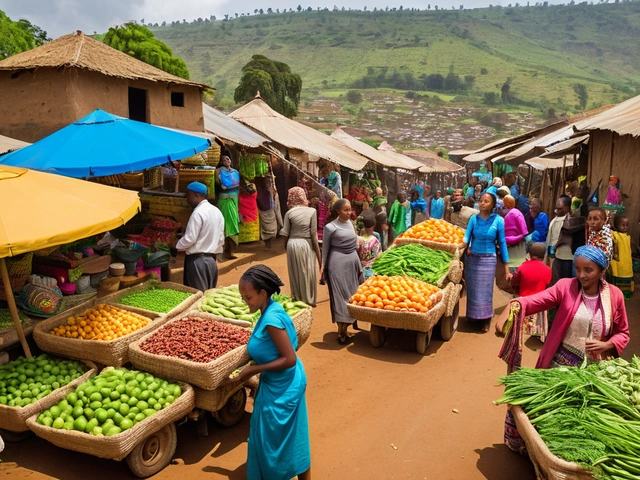 Ways People Earn a Living in Ethiopia: Unique Opportunities and Challenges
Ways People Earn a Living in Ethiopia: Unique Opportunities and Challenges
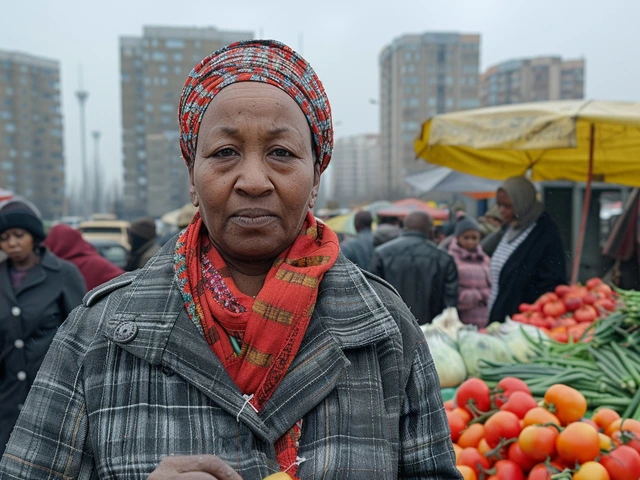 Average Monthly Income in Ethiopia: A Detailed Analysis
Average Monthly Income in Ethiopia: A Detailed Analysis
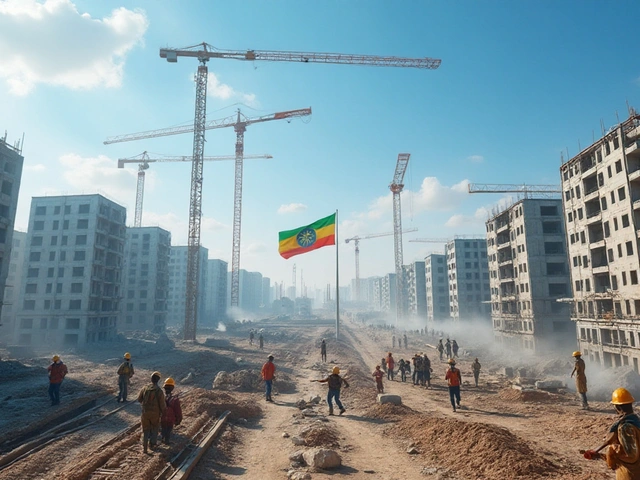 Why is Ethiopia's Economy Growing So Rapidly?
Why is Ethiopia's Economy Growing So Rapidly?
 Leading Causes of Death in Ethiopia: A Detailed Overview
Leading Causes of Death in Ethiopia: A Detailed Overview
 Why Ethiopia is a Must-Visit Destination: Culture, History, and Natural Beauty
Why Ethiopia is a Must-Visit Destination: Culture, History, and Natural Beauty
Jeff Byrd
October 15, 2024 AT 17:46Hey, great overview of how Tinder is becoming a Swiss‑army knife in Ethiopia – romance, networking, even a side hustle. It’s wild to think an app that started with a swipe could now double as a business card. You’ve nailed the balance between modern hustle and respecting the old‑school vibes. Love the note about data costs – that’s the silent gatekeeper nobody talks about.
Joel Watson
October 29, 2024 AT 14:06The proliferation of digital matchmaking platforms within the socio‑economic fabric of Ethiopia, as delineated in the preceding discourse, warrants a rigorous exegesis. Firstly, one must acknowledge the epistemic shift engendered by mobile broadband penetration, which, albeit nascent, has precipitated a paradigmatic reconfiguration of interpersonal modalities. Secondly, the demographic bulge-specifically the cohort under twenty‑five-constitutes a fertile substrate for algorithmic dating metrics, thereby amplifying the probabilistic outcomes of cross‑cultural pairings. Thirdly, the nuanced interplay between traditional courtship rituals and the ostensibly libertine ethos of swipe‑based applications engenders a dialectic tension that is both sociologically salient and anthropologically captivating. Fourthly, on the economic front, the emergent praxis of leveraging profile bios for entrepreneurial visibility underscores a symbiotic convergence of social capital and market capital. Fifthly, the linguistic stratification-Amharic versus English-serves as a semiotic gatekeeper, subtly dictating the permeability of conversational conduits. Sixthly, the infrastructural lacunae endemic to rural vicinities impose a stochastic variance upon user engagement metrics, thereby skewing urban‑centric data sets. Seventhly, one cannot disregard the pervasiveness of digital literacy disparities, which further compound the stratification of access. Eighthly, the potential for exploitation-whether through data mining or fraudulent schemes-necessitates a calibrated regulatory framework. Ninthly, the psychosocial ramifications, such as the attenuation of familial oversight, merit longitudinal scrutiny. Tenthly, the phenomenon of “digital diaspora” communities seeking transnational connections fosters a bidirectional cultural exchange. Eleventhly, the implicit trust mechanisms embedded within swipe‑right algorithms merit a deconstruction of their ethical underpinnings. Twelfthly, the opportunistic infusion of commercial adjuncts-premium subscriptions, in‑app promotions-reflects a monetization trajectory that may recalibrate user expectations. Thirteenthly, the integration of safety protocols, such as geofencing and emergency triggers, remains a desideratum of paramount importance. Fourteenthly, the sociocultural resonance of public perception-stigmatization versus normalization-continues to evolve in tandem with technological adoption curves. Lastly, the overarching narrative elucidated herein portends a transformative epoch wherein the confluence of technology, tradition, and entrepreneurship coalesces into a novel sociotechnical paradigm.
Chirag P
November 12, 2024 AT 11:26I appreciate the balanced tone of the piece. It acknowledges both opportunity and the real hurdles many face, especially the connectivity gaps in rural areas. The cultural insight about family expectations resonates strongly; it’s a reminder that any platform must adapt to local norms. Highlighting language as a bridge rather than a barrier is spot‑on.
RUBEN INGA NUÑEZ
November 26, 2024 AT 08:46Your point about entrepreneurs slipping a portfolio link into a Tinder bio is clever-but watch the grammar. “It’s subtle but allows users to engage curiosity” should be “engage their curiosity.” A polished profile not only attracts matches but also conveys professionalism.
Michelle Warren
December 10, 2024 AT 06:06Honestly this article kinda sucks cause it forgets that most Ethiopians cant even afford data so they wont even try it.
Christopher Boles
December 24, 2024 AT 03:26Great tips! I’d add that meeting in a coffee shop or a public park is a safe first step. Also, keep your bio short and honest; that honesty builds trust quickly.
Crystal Novotny
January 7, 2025 AT 00:46Interesting angle, but I wonder if we’re over‑romanticizing the “networking” aspect. Is it really a viable income stream or just a fringe benefit for the lucky few?
Reagan Traphagen
January 20, 2025 AT 22:06Sure, the article paints a rosy picture, but have you considered the hidden data surveillance? Every swipe could be feeding big tech’s agenda, especially in a country with limited digital rights. Users need to be skeptical about who’s really benefiting.
mark sweeney
February 3, 2025 AT 19:26Well, if you’re looking for a contrarian take, I’d say the “economic opportunities” narrative is a myth perpetuated by fleeting success stories. Most users are just scrolling for fun, not building empires.
randy mcgrath
February 17, 2025 AT 16:46While the concerns about surveillance are valid, they don’t nullify the potential for genuine connections. Users can mitigate risks by using VPNs and limiting personal data sharing.
Frankie Mobley
March 3, 2025 AT 14:06The point about data cost is crucial-without affordable plans, even the most enthusiastic users are stuck. Perhaps community Wi‑Fi hubs could be a solution to democratize access.
ashli john
March 17, 2025 AT 11:26Community hubs would definitely help, especially if they’re paired with digital‑literacy workshops. Teaching people how to protect their privacy while using apps like Tinder is just as important.
Kim Chase
March 31, 2025 AT 09:46Exactly, and those workshops could also cover how to craft a profile that respects cultural expectations while still standing out – a real game‑changer.
David Werner
April 13, 2025 AT 17:46Bear in mind, every app is a surveillance tool.